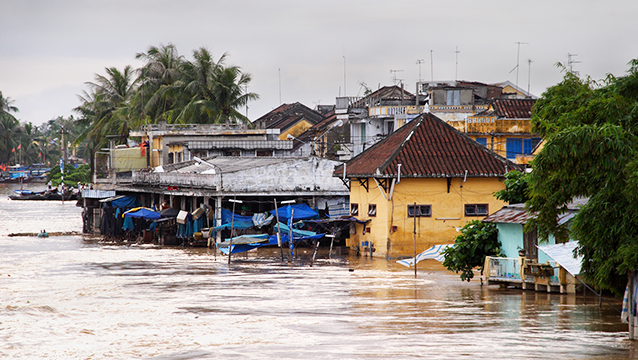At the 57th session of the Nexus Seminar Series, Dr Zita Sebesvari introduced the report “Interconnected Disaster Risks 2020/2021” – an annual science-based publication launched by UNU-EHS in September 2021 that critically “discusses root causes, drivers, and impacts of disastrous events from an integrated, long-term, and systemic risk perspective” for a general public audience.
The ten worldwide disasters highlighted in the report are: the Amazon wildfires, the Arctic heatwave, the Beirut explosion, the Central Viet Nam floods, the Chinese Paddlefish extinction, the COVID-19 pandemic, the cyclone Amphan, the desert locust outbreak, the Great Barrier Reef bleaching, and the Texas cold wave. By finding out patterns across these events, three levels of interconnectivity are highlighted in the report, with regards to their root causes, direct or indirect influence, and impact.
The report explains that these events are only the tip of the iceberg. Therefore, it is crucial to understand root causes and systems structures to recognise better the factors that create favourable conditions for disasters as well as to prevent these issues from happening in the future. The three most commonly identified root causes shared between these 10 events are human-induced greenhouse gas emissions, insufficient disaster risk management, and environmental costs and benefits undervalued in decision-making.
An example of this interconnectivity is the direct influence that the Arctic heatwave had on the Texas cold wave, as an increase in the temperatures in the Arctic can lead to cold waves in mid-latitude regions, such as Europe and North America. COVID-19 also heavily influenced disaster response capacities and increased financial vulnerability, as showcased by the example of the cyclone Amphan, which hit the border region of India and Bangladesh in the midst of the pandemic. In addition to the already deteriorating economic situation in terms of employment and income, many people avoided evacuating to shelters due to social distancing and hygiene. Furthermore, the cyclone destroyed many healthcare centres when there was a spike in COVID-19 cases, which greatly hindered pandemic response efforts.
Overall, COVID-19 exacerbated all the events listed above, serving as a multiplier of risks and influencing most of the disasters. Furthermore, many disastrous events also shared similar impacts, such as loss of livelihoods, reduced food and water security, and loss of biodiversity, which are all emblematic of wider issues that are becoming increasingly problematic in the climate, humanitarian, and biodiversity spheres.
Due to the interconnected nature of events and their underlying root causes, the report highlights the need for integrated solutions. Addressing trade-offs is important to ensure that solutions targeted to address risks in one system do not have a negative impact on another. For instance, pesticides can help control locust outbreaks, but they have negative side effects on biodiversity. Therefore, it is crucial to implement interconnected solutions to address these issues, such as nature-based solutions and adaptive social protection, which help mitigate disaster risks while protecting biodiversity and safeguarding climate change adaptation. As an example, mangrove forest protection and restoration in the Surdanbans would help protect the coasts of India and Bangladesh from storm surges, thus reducing disaster risk while also capturing and storing carbon and providing biodiversity benefits.
In conclusion, according to Dr Zita Sebesvari, “Through analysing the systems created by our attitudes and choices, we can begin to change these systems to work for the benefit of the world as a whole.”
Solutions must be implemented taking into consideration the interconnected nature between disasters to maximise benefits and to minimise risk.
The Nexus Seminar is a monthly lecture series – held in collaboration with PRISMA – Centre for Sustainability Assessment and Policy on behalf of TU Dresden – that highlights all dimensions of research on the Resource Nexus. Find all past and upcoming Nexus Seminars here.




